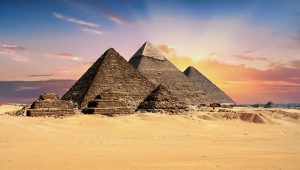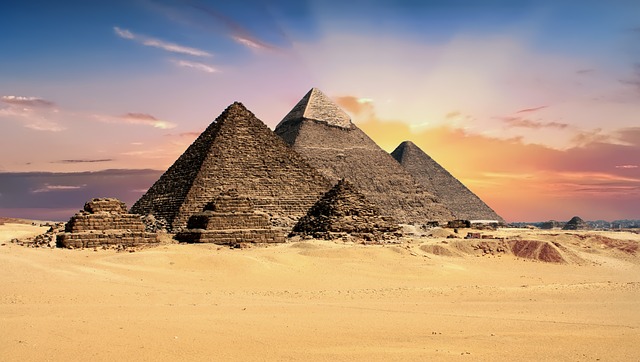
EVERY YEAR WHEN we celebrate Pesach and follow the Haggadah, we arrive at the part of the story where we are reminded once again that “every Jew has to regard himself as if he TOO left Egypt.” AS IF, and only AS IF, because clearly we have all been born thousands of years AFTER it has occurred.
Why the need? It’s obvious. Yetzias Mitzrayim happened long ago. Intellectually we know it is why we are here as a people. Had we NOT left Egypt, we would have probably been Egyptians instead. We would have either died out from slavery or assimilated completely into our host culture. When Moshe Rabbeinu showed up to save the day, we were at the 49th level of spiritual impurity, teetering at the edge of spiritual oblivion.
But who can now relate to that? How many heartstrings does the story of leaving Egypt pull, and in how many people? There are Americans who can trace their family lines back to the pilgrims who first settled America. Do they even know? Do they even care? The Thanksgiving Day celebration today is a LOT different than it once was. It is the same for the Jews who recall the exodus from Egypt.
The Haggadah says no. The Haggadah says, not only does it not have to be, but it SHOULD not be. “Sippur Yetzias Mitzrayim” has to be an EMOTIONAL experience as well as an INTELLECTUAL one. If the Seder is only a mind experience, it will remain only on the level of commemoration of events passed. If it becomes an emotional one, then it becomes a celebration of events currently taking place.
We have help. The Jewish year is cyclical. We may move forward in time, but we also revisit experiences and energies that run all through time and which tie us to events in the past and those which have yet to occur. It’s a timeless spiritual pipeline, and if we tap into it, then we can transcend the moment and literally make ourselves feel as if we too are leaving Egypt.
We do it all the time, usually unwittingly. Someone will say something or something will happen that will trigger a memory of ours. Next thing we know, without going anywhere physically we find that we have left the moment mentally, emotionally. We start to see people from a past moment and even begin to feel what we felt back then. It will become our reality until something snaps us out of our trance and we return once again to the here-and-now.
But that’s only true when we already had the experience once before. It only happens when we have a memory to trigger. None of us actually left Egypt with Moshe Rabbeinu. None of us have an ACTUAL memory of Yetzias Mitzrayim to recall. If we regress our memories, we can’t go back THAT far. That leaves us, once again, at “as if,” but not actually.
Yes, and no. We are making an assumption that though it is logical, it is not actually correct. We are assuming that history has moved on since we first left Egypt. Yes, all that has happened since then is built upon Yetzias Mitzrayim, but not actually a part of it. That is not true.
The navi, when talking about a future redemption made the following connection to the first one:
“As in the days of your exodus from the land of Egypt, I will show him wonders.” (Michah 7:15)
The Ramchal and GR”A explained as follows:
Both the redemption from Egypt and the future redemption come from the same source, as it says, “As in the days of your exodus from the land of Egypt, I will show him wonders” (Michah 7:15). (Ramchal, Otzros Ramchal, p. 45)
Yetzias Mitzrayim was the beginning of all redemptions, and it will be likewise in the future. (GR”A, Shir HaShirim 2:8)
Though at first this just sounds like a simple comparison to what once happened, it is not. The first thing to recall is that we were supposed to have remained in Egypt for 400 years. That was the prophecy of the “Bris Bein HaBesarim” given Avraham Avinu. Even though it did not mention Egypt specifically, historically that is what it was and, Kabbalistically, that is what it had to be.
Therefore, we left 190 years early. And, we left with UNFINISHED business. We also left behind four-fifths of our nation, losing them in the Plague of Darkness. And we took the Erev Rav with us. That alone has plagued us until this very day. The battle against the Erev Rav, the GR”A warned, will be the last and worst of all.
We seem quite prepared to let bygones be bygones. As far as we’re concerned, Yetzias Mitzrayim was a chapter in our history that was closed once the Jewish people left Egypt. We assume that anything that was supposed to happen within 400 years happened instead within the 210 years. After all, God DID increase the slavery before the first plague began, seemingly rectifying in six months what was supposed to have been fixed over the next 190 years.
Wishful thinking. It turns out that all was NOT forgiven.Whatever was accomplished over the 18 months since Moshe Rabbeinu first demanded the release of the Jewish people only made it possible for them to leave Egypt at that time. It did not complete the entire mission described to Avraham Avinu during the prophecy of the Bris Ben HaBesarim. The Jewish people had just not been spiritually up to the task. THAT would take the REST of Jewish history to accomplish.
Here’s the point. Yetzias Mitzrayim did not end back in 2448, or 1313 BCE. It only began then. It is a work that has been in progress ever since then, and one that won’t finish until the Final Redemption. Purim, Chanukah, and any other redemption the Jewish people have experienced since the first one from Egypt just added to what had been thus far accomplished.
This is why the other name for the Final Redemption is “Keitz HaYomim,” the “End-of-Days.” Literally, it is the end of THOSE days. THOSE days? Which days? The one’s left uncompleted back in Egypt? How many of THOSE days are left to complete? “Keitz,” which has the gematria of 190. Then the Jewish people will finally go out “as in the days of your exodus from the land of Egypt.”
After all, more than “Mitzrayim” is a place, it is a concept. The name “Mitzrayim” is comprised of two parts: Mem-Tzaddi-Raish, which spells “meitzer,” or “boundary.” The last two letters, Yud-Mem, have the gematria of 50, alluding to the “Nun Sha’arei Binah,” the “Fifty Gates of Understanding” through which Divine light flows unto the world.
Though “Mitzrayim” the place was Egypt, “Mitzrayim” the concept is ANY place that spiritually restricts the “Nun Sha’arei Binah.” It is any place in the world that is not conducive to building a relationship with God, and the revealing His light to the world.
Today, “Mitzrayim” could even be the FIFTY—Yud-Mem—bordered—meitzer—states of America. It could be the entire Western world, which also includes secular Israel, which is becoming LESS spiritually conducive with each passing day. Leaving THIS “Mitzrayim” may be the biggest “Yetzias Mitzrayim” of ALL history.
It goes even deeper, AND more literal. The Arizal revealed the true nature of the souls of the Jewish people at the end of history, just in advance of Keitz HaYomim:
There is not a single generation in which Moshe Rabbeinu, is not found, b’sod, “The sun rises and the sun sets” (Koheles 1:5), [and] “One generation goes and another comes” (Koheles 1:4), in order to rectify [each] generation. The Generation of the Desert itself with the Mixed Multitude will also reincarnate in the final generation, “like in the days of leaving Egypt” (Michah 7:15). (Sha’ar HaGilgulim, Ch. 20)
We don’t think about reincarnation too often. Why should we? We really have no way of knowing with any certainty who we were in previous lifetimes. It’s a fascinating topic, for some, able to provide insight into parts of Jewish history, thanks to the Arizal. But, without a prophet, how can we know when and how we previously lived?
That is true on a personal level. However, the Arizal is saying that it is possible to know something about the “nature” of the souls of the final generation of the Jewish people. That may not have interested previous generations, but it should catch OUR attention since, by now, it should be clear that there is a VERY good chance that we ARE that “Final Generation.” After thousands of years of history, this probably applies SPECIFICALLY to us.
The question is, what does it mean to have the souls of the Jews who left Egypt? One thing is for certain, when the Haggadah tells us to look at ourselves as if we too left Egypt, it is not only talking about role playing. It is saying to us, “Even though your bodies have been towards the end of history, your souls are from the beginning of Jewish history.” And ultimately, it is the SOUL that drives the person, not the body.
Ultimately it means that we are here, not to complete what THEY left unfinished, but what WE left unfinished. The separation we feel from our ancestors doesn’t really exist. It is between our CURRENT selves and our EARLIER selves. It is our SECRET identity, so secret that most of us aren’t even aware of it, maintaining a mental distance from the past that is real only in time, but not in mission.
The Seder becomes the opportunity to literally break through the barrier of time. History moves linearly forward but the Jewish people move cyclically, allowing us to revisit the PAST again in the FUTURE. We return to ourselves each time in order to pick up where we left off and complete both our personal tikunim and national tikun.
We’re still in exile, after all this time because we have not taken the words of the Haggadah seriously enough. So close to the end of history and part of the “Final Generation,” it is high time that we did. Because, whether we’re ready or not, “Exodus, Phase 2,” is upon us.


